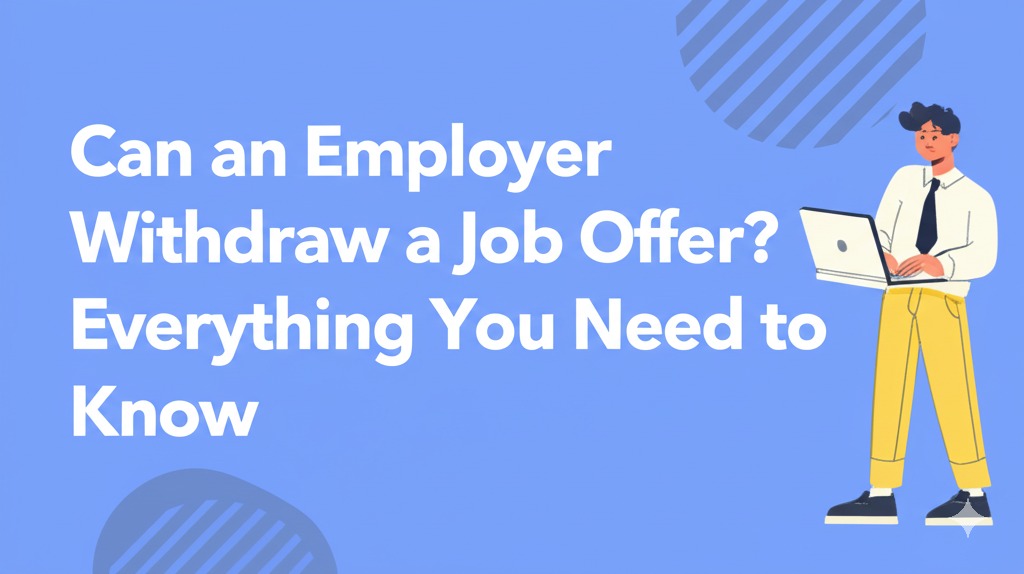
In today’s competitive job market, securing a job offer can feel like the culmination of months of hard work. But what happens if an employer withdraws that offer after you’ve received it? Can they legally do that, and if so, under what circumstances? Understanding your rights and the reasons behind job offer withdrawals is crucial for both job seekers and employers.
This article explores whether an employer can withdraw a job offer, the legal implications, and what steps you can take if you find yourself in this situation.
Can an Employer Legally Withdraw a Job Offer?
Understanding the Basics of Job Offers
A job offer is typically a formal proposal from an employer inviting a candidate to join their company. It can be made verbally or in writing. While receiving a job offer feels like a guarantee of employment, it is not always a binding contract until you sign an official employment agreement.
When Can an Employer Withdraw a Job Offer?
In most cases, an employer can withdraw a job offer at any time before the employee has signed an official employment contract. The offer itself is generally considered an invitation to negotiate, not a binding agreement. Below are a few common scenarios where an employer may choose to revoke an offer:
- Failure to Meet Conditions
If the job offer is contingent on certain conditions being met (such as passing a background check or drug test), the employer can withdraw the offer if the candidate fails to meet those conditions. - Changes in Company Circumstances
Sometimes, an employer may face unforeseen financial difficulties or restructuring. In such cases, they may need to retract a job offer due to changes in company needs. - Candidate’s Actions or Behavior
If a candidate engages in unethical behavior or dishonesty during the hiring process (e.g., lying about qualifications or misrepresenting experience), the employer may choose to revoke the offer. - Legal Issues
If a job offer is made based on incorrect or misleading information, or if there are legal issues related to the hiring process (such as discrimination), an employer may withdraw the offer.
Exceptions to the Rule
Although employers have the right to withdraw a job offer in many cases, there are certain exceptions. For example, if the job offer is backed by a legally binding contract, such as an employment agreement, the employer may face legal consequences if they attempt to retract it. Additionally, in some jurisdictions, employees may have certain rights even before an official contract is signed.
What Are the Legal Implications of Withdrawing a Job Offer?
Is it Discriminatory?
One of the main concerns when an employer withdraws a job offer is whether it constitutes discrimination. If an employer rescinds an offer based on a protected characteristic—such as race, gender, age, religion, or disability—it may be considered illegal under anti-discrimination laws, such as the Civil Rights Act of 1964 or the Americans with Disabilities Act (ADA).
Breach of Contract Claims
If the job offer was part of an employment contract that both parties agreed upon, the employer could be in breach of contract by withdrawing the offer without proper cause. In these cases, the candidate may have legal grounds to pursue damages.
Can You Sue if a Job Offer is Withdrew?
While it’s generally difficult to sue for a withdrawn job offer, candidates may be entitled to compensation in some cases, particularly if the offer was part of a legally binding agreement. Consulting with an employment attorney can help clarify whether a claim is viable based on the specifics of the situation.
How Can You Handle a Job Offer Withdrawal?
1. Stay Calm and Professional
If you’ve received a job offer that is later retracted, it’s important to stay calm and maintain a professional demeanor. Take time to understand why the offer was withdrawn and ask for a clear explanation. Sometimes, an employer may offer an alternative position or explain the reasoning behind their decision.
2. Review Any Documentation
Check the offer letter or any written communication regarding the job offer. If the offer was contingent upon certain conditions, verify that you’ve met those conditions. If you believe the offer was withdrawn unfairly, you may want to consult with a legal professional.
3. Seek Legal Advice
If you feel that the job offer was withdrawn due to discrimination or a breach of contract, seeking legal advice is crucial. A lawyer can help assess whether you have a legitimate case and explain the next steps.
4. Keep Looking for Other Opportunities
While disappointing, a withdrawn job offer doesn’t define your career. Keep applying to other job openings and remain proactive in your job search. It’s important to remember that many people face setbacks during their careers, and perseverance often leads to better opportunities down the road.
What to Do if You’re In This Situation
If you find yourself facing a withdrawn job offer, consider the following:
- Ask for Clarification: If the reason behind the withdrawal is unclear, reach out to the employer and ask for more details. A clear understanding of the reasons will help you decide on the next steps.
- Review Employment Laws: Research the employment laws in your jurisdiction to determine whether your rights have been violated.
- Consult an Attorney: If you believe your rights were violated or you have legal grounds for a claim, consulting with an attorney specializing in employment law may be necessary.
Conclusion: Stay Prepared and Informed
While it can be disheartening to have a job offer withdrawn, it’s important to understand that employers have certain rights when it comes to rescinding offers. Always read the fine print in your job offer letter, and make sure that you meet any contingencies listed. If you find yourself in a situation where your offer has been retracted, remain professional and seek advice if necessary.
In the end, a withdrawn job offer may lead to better opportunities that are more aligned with your career goals. Stay proactive in your job search, and remember that persistence pays off!

Andre Cuevas provides career insights, job search strategies, and professional advice to help individuals navigate the job market and achieve their career goals.






